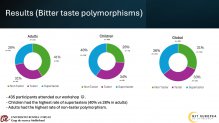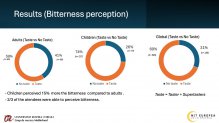MoBioFood participates at European Research Night (2025)
General -
Workshop: Decoding Taste: How Age Influences Bitter Taste Perception
Activity summary
During the European Researchers' Night 2025, the MoBioFood research group presented the interactive workshop "Decoding Taste", designed to engage the general public in discovering how we perceive bitter taste and how this ability changes across the lifespan.
Participants of all ages were invited to test their sensitivity to bitterness using specific tastants that activate bitter taste receptors (TAS2Rs), a family of chemosensory receptors known to play roles beyond taste, including immune and metabolic regulation. The activity aimed to highlight how genetic polymorphisms in TAS2R genes and age-related changes in sensory perception can influence individual differences in bitterness detection.
Scientific background and link to ageing
Bitter taste perception tends to decline with age, reflecting a general reduction in sensory receptor sensitivity. This sensory decline may have physiological implications, as bitter taste receptors are also expressed in extraoral tissues (such as the gut and immune cells) where they contribute to maintaining metabolic and inflammatory balance. Reduced TAS2R activity with ageing could therefore be linked to chronic low-grade inflammation and other age-associated pathologies, a research topic currently explored by the MoBioFood group within the COST-Senescence network.
Public engagement and preliminary results
A total of 435 participants took part in the activity, spanning children, adolescents, and adults. Preliminary results revealed clear age-related differences in bitter sensitivity:
- Around 66% of all participants could detect bitterness.
- Children showed a 15% higher detection rate compared to adults.
- 40% of children were classified as supertasters, compared to 28% among adults.
- The highest proportion of non-tasters was observed in adults.
Impact
The activity successfully combined public engagement, genetics, and ageing research, raising awareness of how everyday sensations like taste can provide insights into the biological processes of ageing. It also encouraged intergenerational participation, fostering curiosity and scientific literacy among both children and adults.



